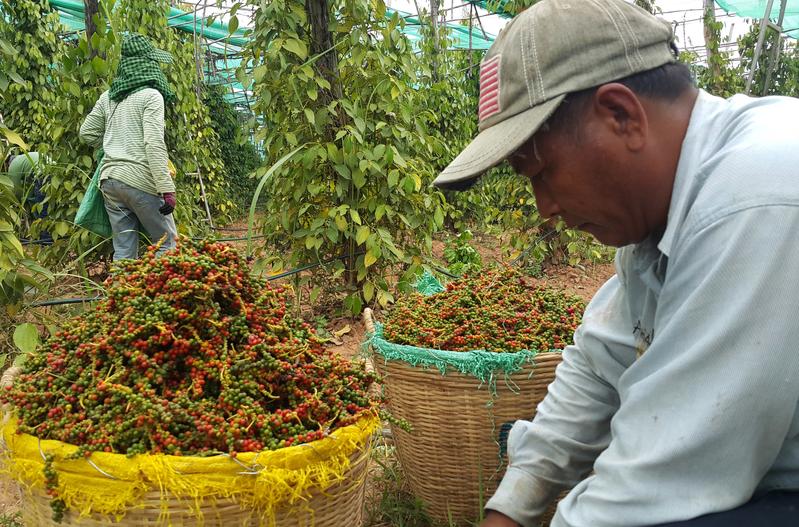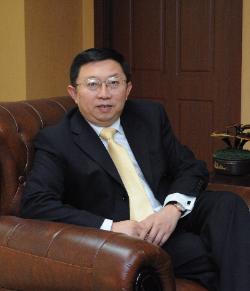 This file photo shows farmers harvesting pepper at a farm in the coastal province of Kampot, southwest Cambodia. (PHOTO / XINHUA)
This file photo shows farmers harvesting pepper at a farm in the coastal province of Kampot, southwest Cambodia. (PHOTO / XINHUA)
The economic cooperation between China and the members of the Association of Southeast Asian Nations, or ASEAN, during the pandemic has set an example for the world, says a trade expert.
In an interview with China Daily, Xu Ningning, executive president of the China-ASEAN Business Council (CABC), said though the pandemic has caused an unprecedented disruption in the flow of international trade, investment and human capital, China and ASEAN not only provided mutual support to each other to fight COVID-19, but also maintained close economic cooperation.
“Trade and investment between China and ASEAN remained robust despite the pandemic, which, to some extent, plays an important role in preventing (a global) economic slowdown,” said Xu. “It also set an example of international economic cooperation during the global fight against COVID-19.”
 Xu Ningning, executive president of the China-ASEAN Business Council (PHOTO PROVIDED TO CHINA DAILY)
Xu Ningning, executive president of the China-ASEAN Business Council (PHOTO PROVIDED TO CHINA DAILY)
ALSO READ: Ambassador: China-ASEAN trade grows 7.7% in Q3
China has been the biggest trading partner of ASEAN for 11 consecutive years. In the first half of this year, the 10-nation bloc became China’s biggest trading partner, according to Xinhua News Agency.
In the first three quarters of this year, trade between China and ASEAN reached US$481.8 billion, up 5 percent year-on-year, said Xu, noting that the bloc now accounts for 14.6 percent of China’s foreign trade.
Trade growth between China and ASEAN is much faster than that between China and other major trading partners, according to Xu. For example, during the same period, China’s trade volume with the European Union, its second largest trade partner, increased only 0.4 percent and that with the United States dropped 0.6 percent. China’s trade with ASEAN was worth US$20.6 billion more than that with the EU.
Further, China’s trade with Vietnam, ASEAN’s chair in 2020, grew 15.6 percent, according to Xu. Vietnam is also China’s largest trading partner within ASEAN.
Xu said the reason China and ASEAN can demonstrate vitality in trade and economic cooperation is because this cooperation benefits all participating countries and regions.
“The vitality of cooperation lies in win-win outcomes,” said Xu. “As China and ASEAN work proactively to form exchanges and provide mutual support, all countries have seen concrete benefits from the cooperation.”
He also noted the importance of the participation from the business sector in supporting China-ASEAN economic cooperation.
“China is the biggest source of investment for many countries in ASEAN,” said Xu, noting that China’s investment in ASEAN amounted to US$6.23 billion in the first half of 2020, growing 53.1 percent on a yearly basis. It accounts for 76.7 percent of China’s investment in economies related to the Belt and Road Initiative, according to the Ministry of Commerce.
“The growing investment from Chinese enterprises in ASEAN not only drives the overseas development of these companies, but also meets ASEAN’s demand for foreign investment and helps the growth of the bloc’s foreign trade,” said Xu, adding other benefits including more job opportunities, an improved industrial chain and industrial upgrading.
Besides maintaining a close interaction to jointly control and prevent the spread of COVID-19, China also worked closely with ASEAN countries to promote economic recovery, including opening “fast tracks” and “green lanes” to facilitate the flow of people and goods with many ASEAN countries during the ongoing pandemic.
Besides maintaining a close interaction to jointly control and prevent the spread of COVID-19, China also worked closely with ASEAN countries to promote economic recovery, including opening “fast tracks” and “green lanes” to facilitate the flow of people and goods with many ASEAN countries during the ongoing pandemic
Xu said these measures are important to China-ASEAN cooperation as strengthening cooperation in trade, investment and infrastructure meets the urgent need of China and ASEAN countries to accelerate socioeconomic recovery as well as the demand for long-term development.
On Feb 20, CABC, together with a number of industrial and commercial organizations from China and ASEAN countries, issued an initiative to jointly fight the contagion and vowed to contribute to economic growth by maintaining trade and investment exchanges.
In addition, Xu said CABC has held a series of international meetings to promote the establishment of “fast tracks” to facilitate economic growth.
Xu said ASEAN is an important partner for China in enhancing globalization. “It is among the first to mutually open up markets with China and to embrace the BRI,” he said, adding that in 2019 seven out of ten countries to top the list of China’s non-financial investment in BRI countries are ASEAN countries.
The cooperation under BRI between China and ASEAN has laid the foundation for the two parties to work closely during the pandemic, said Xu. On the other hand, he said China-ASEAN cooperation has added new mission for the BRI as trade is an important engine that drives economic growth.
“Participating in the BRI is conducive for the building of the ASEAN Community and for ASEAN countries to reach their goals for economic growth,” said Xu.
As many international organizations, including the World Bank and the International Monetary Fund, have forecast the ASEAN economy to show a strong rebound next year, Xu said he expects to see the China-ASEAN cooperation in trade and investment to continue.
READ MORE: China, ASEAN ready to embrace opportunities
The closer relationship is also supported by deepened cooperation under the BRI, the China-ASEAN free trade area protocol upgrade, and the Regional Comprehensive Economic Partnership, which is expected to be signed within this year, said Xu.
Next year will be the 30th anniversary of the ASEAN-China dialogue relations. Xu said the two parties should focus on high-quality economic cooperation to support the strategic partnership.
“China is among the first to voice firm support for ASEAN’s centrality in regional cooperation and the centrality can only be fortified by the bloc’s prosperity,” said Xu. “This requires open and broad cooperation.”


